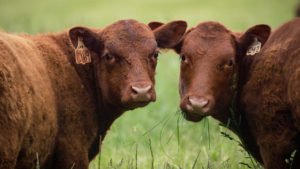New study busts myths around organic integrated crop-livestock rotations
Researchers find that organic integrated crop-livestock rotations are as safe as or safer than conventional practices
 Photo Credit: USDA
Photo Credit: USDA
A groundbreaking study out of Iowa State University tackled the myth that animal and crop production must be kept separate to prevent food pathogens, with findings that showed organic integrated crop-livestock operations were as safe as (or even safer) than conventional practices where crops and livestock were not integrated.
Researchers monitored three experimental organic farms with integrated crop-livestock systems, where crops were rotated with cattle. Looking at pathogens in meat produced on the farms they found no traces of common strains of E. coli O157:H7, a bacterial strain that can cause serious illness in humans; or for salmonella. They also tested cattle hide, feed, and fecal samples for pathogens, and found levels similar to those on conventional operations.
This study is exciting because integrated crop/livestock operations have numerous environmental benefits, such as improved soil quality, increased yield, reduced dependence on external inputs, supporting pollinators, aiding in pest management, and improved land use efficiency. Unfortunately, these integrated systems have been plagued by myths surrounding safety. This research puts those fears to rest by proving the safety of organic integrated crop-livestock systems.


